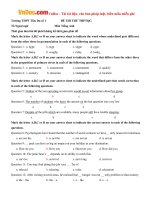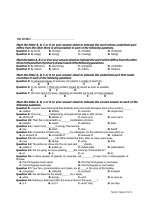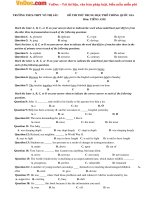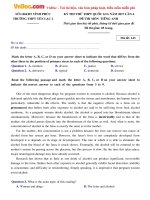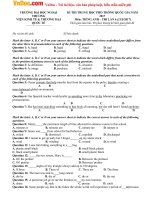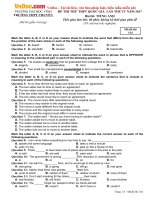Đề thi thử THPT Quốc gia năm 2017 môn Tiếng Anh trường THPT chuyên Nguyễn Quang Diêu, Đồng Tháp có đáp án (Lần 1)
Bạn đang xem bản rút gọn của tài liệu. Xem và tải ngay bản đầy đủ của tài liệu tại đây (323.28 KB, 5 trang )
TRƯỜNG THPT CHUYÊN
NGUYỄN QUANG DIÊU
_________________
ĐỀ THI THỬ THPT QUỐC GIA LẦN 1- 2017
Môn thi: TIẾNG ANH
Thời gian: 60 phút (không kể thời gian phát đề)
Ngày thi: /2/2017
Họ, tên thí sinh:.....................................................................
Số báo danh:..........................................................................
Mã đề: 591
Mark the letter A, B, C, or D on your answer sheet to indicate the word(s) OPPOSITE in meaning to
the underlined word(s) in each of the following questions.
Question 1: An employer must be very careful in dealing with subordinates and documenting their
files in order to avoid complaints.
A. coordinators
B. bosses
C. outside help
D. employees
Question 2: I have never experienced such discourtesy towards the guests as it occurred at the
graduation party.
A. encouragement
B. politeness
C. rudeness
D. measurement
Mark the letter A, B, C, or D on your answer sheet to indicate the word that differs from the other
three in the position of primary stress in each of the following questions.
Question 3: A. electronic B. petroleum
Question 4: A. substantial B. demolish
C. proficiency
C. terrorist
D. equivalent
D. dramatic
Mark the letter A, B, C, or D on your answer sheet to indicate the word(s) CLOSEST in meaning to
the underlined word(s) in each of the following questions.
Question 5: The event, watched by millions of people all over the country, takes place annually.
A. sometimes
B. once every year
C. regularly
D. smoothly
Question 6: The government is not prepared to tolerate this situation any longer.
A. look down on
B. put up with
C. take away from
D. give onto
Mark the letter A, B, C, or D on your answer sheet to indicate the underlined part that needs
correction in each of the following questions.
Question 7: A smile can be observed, described, and reliably identify; it can also be elicited and
A
B
C
manipulated under experimental conditions.
D
Question 8: A number of the American Indian languages spoken at the time of the European arrival in
A
B
C
the New World in the late fifteen century have become extinct.
D
Question 9: Mrs. Stevens, along with her cousins from New Mexico, are planning to attend
A
B
C
D
the festivities.
Read the following passage and mark the letter A, B, C, or D on your answer sheet to indicate the
correct word or phrase that best fits each of the numbered blanks.
Teaching English as a foreign language can be a great way to travel the world and earn money at the
same time. However, some graduates actually like the idea of (10) ______ a career in teaching English
long-term, and there are numerous courses at various (11) _______ of teaching, from the fast-track
TEFL to a diploma or masters.
Mã đề 591 - Trang 1/5
To find the right course a good place to start is TEFL.com - a website with lots of relevant information
and helpful advice, including a comprehensive list of institutions in the UK offering TEFL courses.
The site also offers a job search facility to assist qualified students (12) _______ finding work.
When deciding which course to take, the best bet is to look at what your needs are. If you want a career
in teaching English then definitely find one designed for that (13) _______, like an MA or diploma; but
if you want to travel around the world, then do a shorter course which will supply you with teaching
skills.
Some countries, like Japan, will employ people without a teaching qualification as (14) _______ as the
teacher is a native speaker of English. However, most countries do now expect a qualification.
Question 10:
Question 11:
Question 12:
Question 13:
Question 14:
A.
A.
A.
A.
A.
pursuing
levels
for
purpose
far
B.
B.
B.
B.
B.
hunting
groups
in
function
well
(Adapted from “Earn after you learn” by Kate Harvey)
C. chasing
D. tracking
C. categories
D. classes
C. at
D. to
C. aim
D. use
C. soon
D. long
Read the following passage and mark the letter A, B, C, or D on your answer sheet to indicate the
correct answer to each of the questions.
Although only a small percentage of the electromagnetic radiation that is emitted by the Sun is
ultraviolet (UV) radiation, the amount that is emitted would be enough to cause severe damage to most
forms of life on Earth were it all to reach the surface of the Earth. Fortunately, all of the Sun’s
ultraviolet radiation does not reach the Earth because of a layer of oxygen, called the ozone layer
encircling the Earth in the stratosphere at an altitude of about 15 miles above the Earth. The ozone
layer absorbs much of the Sun’s ultraviolet radiation and prevents it from reaching the Earth.
Ozone is a form of oxygen in which each molecule consists of three atoms (O3) instead of the two
atoms (O2) usually found in an oxygen molecule. Ozone forms in the stratosphere in a process that is
initiated by ultraviolet radiation from the Sun. UV radiation from the Sun splits oxygen molecules with
two atoms into f r e e oxygen atoms, and each of these unattached oxygen atoms then joins up with an
oxygen molecule to form ozone. UV radiation is also capable of splitting up ozone molecules; thus,
ozone is constantly forming, splitting, and reforming in the stratosphere. When UV radiation is
absorbed during the process of ozone formation and reformation, i t is unable to reach Earth and cause
damage there.
Recently, however, the ozone layer over parts of the Earth has been diminishing. Chief among the
culprits in the case of the disappearing ozone, those that are really responsible, are the
chlorofluorocarbons (CFCs). CFCs meander up from Earth into the stratosphere, where they break
down and release chlorine. The released chlorine reacts with ozone in the stratosphere to form chlorine
monoxide (CIO) and oxygen (O2). The chlorine then becomes free to go through the cycle over and
over again. One chlorine atom can, in fact, destroy hundreds of thousands of ozone molecules in this
repetitious cycle, and the effects of this destructive process are now becoming evident.
Question 15: According to the passage, ultraviolet radiation from the Sun_______.
A. is only a fraction of the Sun's electromagnetic radiation
B. creates electromagnetic radiation
C. is causing severe damage to the Earth's ozone layer
D. always reaches the Earth
Question 16: The word “encircling” in paragraph 1 is closest in meaning to_______.
A. surrounding
B. attacking
C. rotating
D. raising
Mã đề 591 - Trang 2/5
Question 17: It is stated in the passage that the ozone layer_______.
A. shields the Earth from a lot of ultraviolet radiation
B. reaches down to the Earth
C. enables ultraviolet radiation to reach the Earth
D. reflects ultraviolet radiation
Question 18: The pronoun “it” in paragraph 2 refers to_______.
A. damage
B. process
C. formation
D. radiation
Question 19: The word “culprits” in paragraph 3 is closest in meaning to which of the following?
A. Group members
B. Guilty parties
C. Leaders
D. Detectives
Question 20: According to the passage, what happens after a chlorine molecule reacts with an ozone
molecule?
A. The two molecules combine into one molecule.
B. The ozone breaks down into three oxygen atoms.
C. Three distinct molecules result.
D. Two different molecules are created.
Question 21: The paragraph following the passage most likely discusses_______.
A. the causes of the destruction of ozone molecules
B. the negative results of the cycle of ozone destruction
C. where chlorofluorocarbons (CFCs) come from
D. how electromagnetic radiation is created
Read the following passage and mark the letter A, B, C, or D on your answer sheet to indicate the
correct answer to each of the questions.
In the primary school, a child is in a comparatively simple setting and most of the time forms a
relationship with one familiar teacher. On entering secondary school, a new world opens up and
frequently it is a much more difficult world. The pupil soon learns to be less in the way he speaks to
teachers and even to his fellow pupils. He begins to lose gradually the free and easy ways of the
primary school, for he senses the need for a more cautious approach in the secondary school where
there are older pupils. Secondary staff and pupils suffer from the pressures of academic work and seem
to have less time to stop and talk. Teachers with specialist roles may see hundreds of children in week
and a pupil may be able to form relationships with very few of the staff.
He has to decide which adults are approachable; good schools will make clear to every young
person from the first year what guidance and personal help is available- but whether the reality of life
in the institution actually encourages requests for help is another matter.
Adults often forget what a confusing picture school can offer to a child. He sees a great deal of
movement, a great number of people-often rather frightening looking people- and realises that an
increasing number of choices and decisions have to be made. As he progresses through the school the
confusion may become less but the choices and decisions required will increase. The school will
rightly expect the pupil to take the first steps to obtain the help he needs, for this is the pattern of adult
life for which he has to be prepared, but all the time the opportunities for personal and group advice
must be presented in a way which makes them easy to understand and within easy reach of pupils.
Question 22: According to the passage one of the problems for pupils entering secondary school is
that_______.
A. they are taught by many different teachers B. the teachers do not want to be friendly
C. they do not attend lessons in every subject D. the teachers give most attention to the more
academic pupils
Question 23: The teachers at secondary school do not talk much to the pupils because_______.
Mã đề 591 - Trang 3/5
A. the pupils are afraid of them
B. they are too busy with their academic work
C. it is the regulation of the school
D. they want to keep a certain distance with the
pupils
Question 24: In secondary schools every pupil having problems should_______.
A. be able to discuss his problems with any teacher B. be able to discuss his problems in class
C. be freed from any pressure of academic work
D. know how to ask for help
Question 25: What will the school rightly expect the pupils to do?
A. they firstly obtain the help.
B. they think carefully.
C. they understand well.
D. they study hard.
Question 26: The word “adults” in the second paragraph refers to_______.
A. the secondary pupils’ parents
B. the pupils at secondary school
C. the teachers and pupils at secondary school D. the staff at secondary school
Question 27: How many pupils do teachers see in a week?
A. One pupil
B. Hundreds of pupils C. Many pupils
D. A few of pupils
Question 28: Who do the pupils make relationship with?
A. A few of the staff B. Other parents
C. Other pupils
D. Few of the staff
Question 29: In this passage about secondary schools, the author is mainly concerned about
A. the training of the individual teachers
B. the personal development of pupils
C. the role of specialist teachers
D. academic standards
Mark the letter A, B, C, or D on your answer sheet to indicate the correct answer to each of the
following questions.
Question 30: The Chinese________ spaghetti dishes for a long time before Marco Polo brought it
back to Italy.
A. made
B. have made
C. had been making
D. have been making
Question 31: Everyone likes________ when they have got some success.
A. being congratulated B. to be congratulating C. to congratulate
D. to be congratulated
Question 32: I’ve got lots of________ but only a few really good friends.
A. acquaintances
B. neighbors
C. partners
D. best mates
Question 33: Tim: “I don’t think I can do this one.” John: “______.”
A. Not at all
B. No way
C. Oh, come on! Have a go! D. I hope not
Question 34: Vietnam exports a lot of rice. It is grown mainly in the south of the country.
A. Vietnam exports a lot of rice which grown mainly in the south of the country.
B. Vietnam exports a lot of rice grown mainly in the south of the country.
C. Vietnam, which is grown mainly in the south of the country, exports a lot of rice.
D. Vietnam exports a lot of rice, that is mainly grown in the south of the country.
Question 35: If I________ that there was a test yesterday, I would not be punished now.
A. have known
B. had known
C. knew
D. would know
Question 36: Remember to bring with you your school certificate and letters of________ from your
teachers or your previous employers when you come to the interview.
A. invitation
B. recommendation
C. assignment
D. advertisement
Question 37: We don't allow anyone to use their cell phones during the examination.
A. Everybody isn't allowed using their cell phones during the examination.
B. Nobody is allowed using their cell phones during the examination.
C. Nobody isn't allowed to use their cell phones during the examination.
D. Nobody is allowed to use their cell phones during the examination.
Question 38: Don’t be late for the interview, ________ people will think you are a disorganized
person.
A. lest
B. unless
C. so
D. otherwise
Mã đề 591 - Trang 4/5
Question 39: The marriage pattern of parents plays an extremely important role in ________ marriage
roles of children
A. social
B. socialist
C. socialism
D. socializing
Question 40: He behaved so recklessly, so he would be disqualified from keeping his last job.
A. If he hadn’t behaved so recklessly, he hadn’t quit his last job.
B. He didn’t quit his job because he knew that he had behaved so recklessly.
C. Had he not behaved so recklessly, he wouldn’t have been fired from his last job.
D. Without his reckless behavior, he would have lost his last job.
Question 41: Many plant and animal species are now on the________ of extinction.
A. margin
B. danger
C. verge
D. border
Question 42: “Why didn't you answer my phone last night?” he said.
A. He asked me why I didn't answer his phoned the night before.
B. He asked me why I hadn't answered his phone the night after.
C. He asked me why I hadn't answered his phone the night before.
D. He asked me why he hadn't answered my phone last night.
Question 43: The teacher asked a difficult question, but finally Ted________ a good answer.
A. came up for
B. came up to
C. came up with
D. came out of
Question 44: By the end of next month, Sarah________ in government for 40 years.
A. will be working
B. will work
C. is working
D. will have been working
Question 45: The top tourist ________ in Vietnam, Ha Long Bay features thousands of islands, each
topped with thick jungle vegetation, forming a spectacular seascape of limestone pillars.
A. attractive
B. attract
C. attractiveness
D. attraction
Question 46: Sarah: “Do you think Dad will want something to eat after he gets home from work?”
Brian: “________”
A. We’ll book a table for three at the Sofia’s. B. I hope not. He’s sleeping.
C. Of course not. He needs a steam bath.
D. No. I’ll ring him back at ten.
Question 47: As soon as the supplies arrive, they will be________ to the starving people in the
flooded areas.
A. contributed
B. attributed
C. submitted
D. distributed
Question 48: In spite of all our efforts, we failed in the final match.
A. Whatever efforts we had made; we were able to win in the final match.
B. We failed in the final match as a result of all our great efforts.
C. Although we tried very hard, we failed in the final match.
D. We made all our efforts so that we could again success in the final match.
Mark the letter A, B, C, or D on your answer sheet to indicate the word whose underlined part
differs from the other three in pronunciation in each of the following questions.
Question 49: A. eliminate B. dedicate
Question 50: A. patient
B. ocean
C. educate
C. decision
D. certificate
D. cushion
THE END.
Mã đề 591 - Trang 5/5

